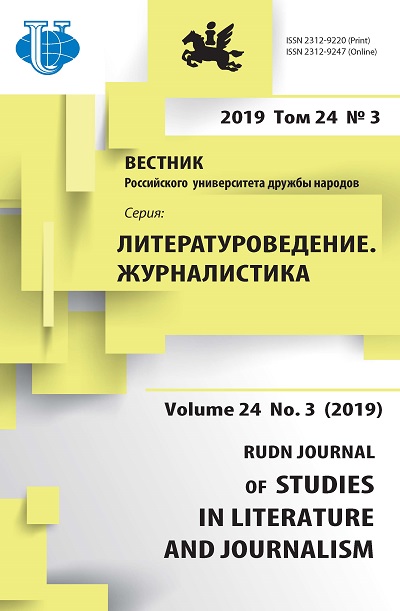The acceptance of I.A. Bunin in China in the context of ideological direction
- Authors: Liu Y.1
-
Affiliations:
- Peoples' Friendship University of Russia (RUDN University)
- Issue: Vol 24, No 3 (2019)
- Pages: 444-448
- Section: Comparative Studies
- URL: https://journals.rudn.ru/literary-criticism/article/view/22339
- DOI: https://doi.org/10.22363/2312-9220-2019-24-3-444-448
- ID: 22339
Cite item
Full Text
Abstract
The disagreement between liberal and communist ideological doctrines had a direct impact on the reception of I.A. Bunin's works in China. Having rejected the left ideology, the Chinese community rethought the work of many foreign classics, including Bunin. Liberal ideology has changed, among other things, ideological views on literature, helped by acquaintance with the latest theoretical studies of Western literature. This aroused a natural interest in perceiving the creative heritage of Bunin in China, and made it possible to look at many of its aspects in a new and deeper way. Hereby, this article analyzes the influence of political ideologies on the reception of Bunin’s works in China.
Keywords
About the authors
Yuanyuan Liu
Peoples' Friendship University of Russia (RUDN University)
Author for correspondence.
Email: yuanliu93@mail.ru
Ph.D. student of the Department of Russian and Foreign Literature of Philological Faculty of Peoples' Friendship University of Russia
6 Miklukho-Maklaya St., Moscow, 117198, Russian FederationReferences
- Mao Dun. Collected Works of Mao Dong. Beijing: Publishing House of Folk Literature, 2001. 310 p.
- Mao Dun. Brief biographies of thirty-eight Russian writers // Xiaosho Yuebao (special issue). 1921. No. 12. p. 162.
- Mao Zedong. Selected Works of Mao Zedong. Vol. 8. Beijing: Renmin Publ., 1999. 443 p.
- Liu Xiaofeng. Love and awe of our generation. Beijing: Hua Xia Publ., 2007. 241 p.
- E Hun. Literary Fate of I.A. Bunin in China // Russian Language Abroad. 2010. No 5. Pp. 82–87.
- Feng Yului. Crossroads and the return of Ivan Bunin. Shanghai: Shanghai Foreign Languages Publishing House, 1998. 229 p.
Supplementary files















